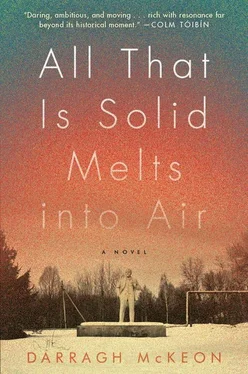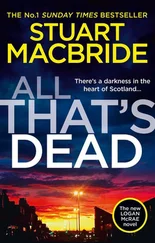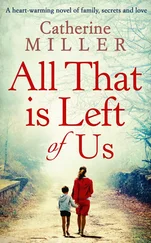The sound of skates cutting into ice.
She continues. “Things are coming my way. I don’t know. Worrying things. A neighbour of mine has seen cats strung up from lampposts. They mean something. I know it. There are kids in the Tishinski markets on Sundays buying up old military uniforms, cutting them up, making fashion statements. Other things too. I hear of clubs where women dance with replicas of red star medals over their nipples.”
“And you disapprove?”
“Of course I don’t disapprove—let them jerk off over the whole army. But I need to know I’m not wrong. Something is happening. I can feel it.”
“You’re worried?”
“No. I don’t know what I am. Restless, maybe.”
“You’re thinking maybe you want to get involved.”
“That’s not it. I have responsibilities. I have people who rely on me. I’m just barely clawing my way back from the wilderness.”
Pavel doesn’t speak for a while, simply blows on his gloved hands, rubs them together. The length of their friendship apparent in the silences.
“There are so many nights when I’m in a reception room in the faculty, sharing a drink with former students, and I don’t know who I am. I’m droning on, making witty remarks, droll observations, to people who are no better than reptiles, men whose job it is to do obscene things.”
He turns to her, and Maria notes that he’s more reticent than before, another way the years have taken hold. She couldn’t imagine hauling him through a blazing row any longer, a sombre weight to his words now.
THEIR RELATIONSHIP was largely built upon ideological arguments. She was constantly questioning, reviewing, surmising, churning all her newly gained knowledge through the prism of her personality. She’d argue with him anywhere. So many times their lovemaking was abandoned because of a throwaway comment from him. Or she would storm into his office, not bothering to check if there was a colleague inside, and bombard him with her fusillade of newly researched facts, slinging in an occasional well-chosen quote to underline her point. On one occasion, she exploded into a barber’s while he was in the chair getting a shave, picking up an argument in which he had silenced her, one day before, with his experience of debate and with the tapestry of facts that were always within his reach. A narrow, smoke-filled room with two barber’s chairs, one empty, and a row of waiting men, strands of hair clinging to the glass mirrors. She pushed open the door and cleared the barber away as he held his blade aloft, astonished, looking to his customers for support, but they were as shocked as he. Pavel’s rebuttals came so rapidly, with such force, that the front of her coat was dotted with flecks of shaving cream. Pavel remembers that he wiped his face clean, put on his jacket, paid, and left, with a stubble-mottled face, all without breaking the flow of the argument, countering her well-prepared perspectives, loving every moment of it. Loving the intellectual stretch she provided. Loving how it was intertwined with her naïvety, so that often she would be unable to recognize the limits of her argument, blowing everything out of proportion. And in these moments he would pause, would cease his replies, and Maria would realize her error and he would spend the next couple of hours trying to coax her back from her disappointment in herself. Trying to make her see that it was her commitment to her subject, her righteous fury, that made her so attractive.
“YOU’VE HEARD the joke about the chicken farmer?” he asks Maria.
“I don’t think I have.”
“A chicken farmer wakes one morning and goes into the yard to feed his brood. He finds ten of them dead. There is no reason for this. They were healthy, some of his best birds, so he is confused. He is worried the rest of the brood may be similarly affected, so he decides to ask comrade Gorbachev for help. ‘Give them aspirin,’ the premier says. The farmer does this, and ten more die that night. This time the premier suggests caster oil. The farmer does as suggested, and ten more are dead the next day. He goes back to Gorbachev and is told to give them penicillin. He does this and, the next morning, all the chickens have died. The farmer is distraught. ‘Comrade Gorbachev,’ the farmer says, ‘all my chickens are dead.’ ‘What a pity,’ Gorbachev replies. ‘I had so many more remedies to try.’”
Maria smiles at him. He’s always had a beguiling mouth, shape-shifting, simultaneously knowing and innocent.
“And this is funny?”
“She comes to me for help and ridicules me. It’s fine. Funny isn’t the point. The joke is the point. The weakness is the point. The fact that they are telling this joke on production lines, at football matches, in taxis, this is the point. Where we’ve come to. This is the point. I haven’t written a line of poetry in nearly twenty years. Not since the crackdown after the Prague Spring. I took my reputable job and taught the books they wanted me to teach, stayed away from saying anything controversial by telling little smutty stories about the writers’ lives.”
Absently, he packs some snow between his gloves, forming a concave disc.
“So many of my friends kept writing. Even in the camps they wrote. Even when they got to their lowest point.” He is very still, then continues. “They’re dead or hobbled now, and I’m still eating professorial lunches. You know how they got their writing out of the prisons?”
“I’ve heard a few different ways.”
“They swallowed it and shat it. Or rolled it on their tongue and exchanged it in a visitor’s kiss. Women secreted it inside themselves and let the guards pretend to attempt to pick it out. Can you imagine the humiliation? They did what they felt necessary.”
“How many times did we talk about this, even back then? Go and ask one of your friends—the ones who are still alive—if you should have kept writing. See what they’ll say.”
“They can absolve me precisely because they’ve been through it. I can’t absolve myself.”
A ski jumper misjudges his flight, coming down in a flurry of light snow.
“I can feel it too, a moment opening up. They see their flaws, they are aware of the need to modernize. Gorbachev looks at those leaders before him—Chernenko, a senile old cripple with emphysema; Andropov, a man who had to have dialysis twice a week, who was so sick that everyone suspected the general secretary was in fact dead—and he is pushing for change but doesn’t know how to modulate it. We are making jokes about the man’s indecision. He is no longer a figure of fear. People are hungry for more. I know you see this too. But there is only confusion now; no idea where to push, who to ask.”
Maria nods. “Sometimes I hear these words, ‘glasnost,’ ‘perestroika,’ and they sound to me like the final breaths of an empire.”
Pavel throws the disc of snow towards the trees, they watch it disassemble in the air.
“There are some people I want you to meet.”
“People?”
“Yes, people. People I respect. Not windbags or idealists. Serious people. People who are talking of serious things, about access to markets, a maximization of resources.”
“I’m not asking for a way in, Pavel. I just want to be ready.”
“Have you thought about the possibilities of us going back to where we were? They may close ranks again soon.”
“It can’t happen on its own, you know. In the fifties, I drank for three days straight when word trickled out about Khrushchev’s secret speech. The end of Stalinism, the end of fear. We were expecting an era of prosperity. We listened for a great chorus of contradictory opinions. But it didn’t come. So we went back to doing what we do so well: watching, deluding ourselves with fragile hopes, with an occasional moment of grace or luck; holding on to these things as omens. Hoping ourselves into inaction. Perhaps in a year we’ll be shot for daring to tell a stupid chicken-farmer joke.”
Читать дальше












